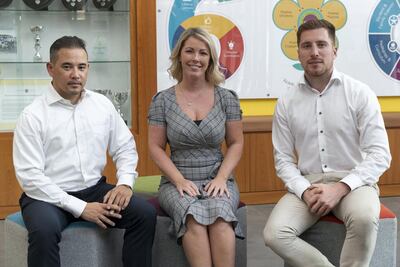Overworked UAE teachers need better pay and more support to stop them leaving the profession, experts said.
This month, Federal National Council member, Ayesha bin Samnoh raised the issue of increasingly disenchanted teachers who can’t wait to retire.
She said only in the last three years more than 1,000 public school teachers have tendered their resignations.
She said teachers were downbeat about a lack of opportunities for promotion and would like to have a bigger say in how the curriculum is shaped.
The problem isn’t restricted to the UAE, as a recent survey found one out of four teachers wants to quit their job in UK.
The National Education Union's survey of 8,600 teachers found that 40 per cent of teachers wanted to leave education due to huge workloads.
Sanam Yaqub, partnership strategies manager at the University of Birmingham in Dubai, has worked as a teacher for more than a decade in the Emirates and has witnessed at first hand the frustrations of colleagues.
"Teachers have a passion for their subject and they want to share that passion with others. But, the reality is that the workload for many teachers is beyond what they can manage, and that is one of the main reasons they leave," she said.
"We need to influence government and policy makers to really look into the issue of teacher wellbeing. Teachers need autonomy and input when policies are changed."
Ms Yaqub said the KHDA, Dubai's private schools regulator, has done a lot to support the wellbeing of teachers and to ensure they remain in the profession while developing their skills.

"How teachers are remunerated and rewarded, through finance or support, needs to be looked into.
“Teaching as a profession is just as important as being a doctor. Then, why are we not remunerating teachers similarly?"
The expert believes more work is required when it comes to supporting teachers in weak schools.
Public school salaries are typically lower than in the private sector, though this can vary throughout the Emirates.
Starting salaries in Abu Dhabi's public schools have previously been reported as being in the Dh12,500 to Dh20,500 range though are often less in some of the other emirates. Some lower-end private schools offer less than Dh4,000 with no accommodation allowance. That rises to about Dh17,000 plus accommodation in top-rated schools.
But the salaries on offer do often compare favourably with other parts of the world, where employees will also pay income tax.
Typically, a teacher in India earns between Dh900 to Dh1,500 per month though this can go up to Dh5,000 in top schools. In the UK, school teachers can expect to get a minimum salary of Dh9,000 to Dh14,000 per month.
Last month, The National revealed the UAE had launched a recruitment drive to lure leading teachers from India to work in Emirati government schools by offering them significant salary hikes.
The salary on offer to successful candidates, Dh16,000 per month, is more than ten times the salary an average Indian teacher can expect to earn in their home country, experts said.
The world is grappling with a global shortage of good quality teachers as work overload drives many away from the profession.
According to the Unesco institute for statistics, if the current trend continues 33 countries will not have enough teachers to provide good quality education by 2030. Also, the UIS found that 69 million teachers need to be recruited over the world to achieve universal primary and secondary education by 2030.

Robert Welsh, founder of support group Teacher Socials, moved from a private school to a public one as he wished to focus on teaching and avoid the high levels of paperwork that was part of his life at a private school. He said that though public schools have their own challenges, the focus is on teaching.
“The reason I moved to public sector is that paperwork and workload were reduced and the focus was on teaching in these schools.
“When I worked in Al Ain at a private school, I had to input every student’s answer into a system to analyse these answers. However, the school was doing nothing with the data.
“I wouldn’t leave till 6pm when school finished at 2.30pm. If you left early it was frowned upon. It was heartbreaking and demoralising.
“I was working for an extra five to six hours every day. Straight after our lessons, we had to hit tonnes of paperwork and this added to the teacher’s anxiety."
He said some teachers had to stay back until late at night to finish paperwork which led to anxiety and stress and, over time, teachers lost their drive, passion, and creativity.
Mr Welsh believes schools need to be more supportive and understanding of teachers. He said schools can use technology to collect data directly and reduce the paperwork and load of teachers while allowing them to focus on their jobs.
Rashmi Nandkeolyar, principal of Delhi Private School Dubai, believes teachers can often struggle to come to terms with the requirements of the UAE’s education system.
“It is not an easy job, because the demands of the UAE are different from our home countries and there is a lot of retraining required. This puts pressure on teachers," said Ms Nandkeolyar.
“They are stressed, especially at the time of joining from their home countries.
“We need better remuneration for teachers. I think teaching should be one of the best paying jobs so that it is respected"
She said, however, there are many benefits to teaching in the country.
"Teaching is one of the most stable jobs and teachers get a lot of holidays. A lot of people like those advantages."


